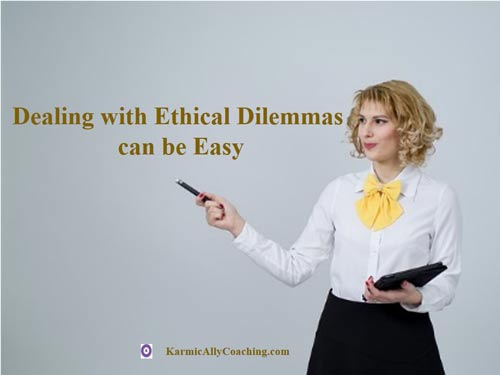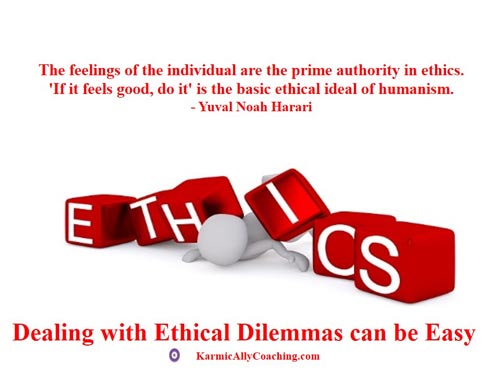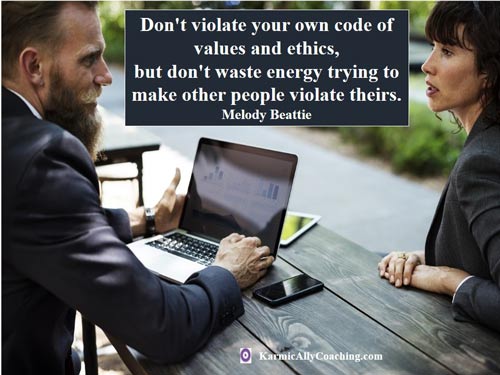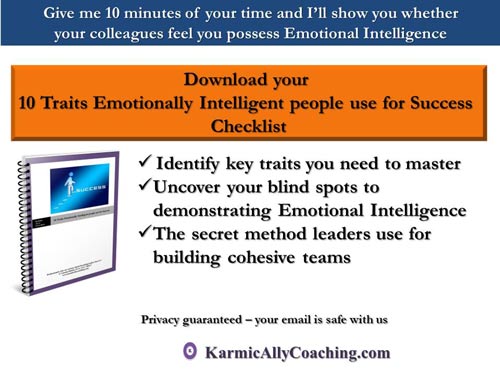This post has already been read 1355 times!

Have you ever been in a situation at work where your boss has asked you to do something or take an action that you either knew was unethical or on the face of it felt wrong?
Or maybe it is something that made you feel uncomfortable because it went against your values and principles?
Although it’s not always the case, that’s how many ethical dilemmas start out.
It’s become normal for me to get questions on fudging resumes to get a job or even lying during a job interview.
While I understand the desperation of the person who has lost a job during the current pandemic and wants one quickly, I’ve always advised against it and I’ve explained the importance of staying in integrity in the post.
Are you in integrity? Employers verify resumes for the job
It’s equally important to maintain your personal ethics even when it is in conflict with the ethics of the other person or the organization.
I recall many years ago when I was the Senior Manager for an audit client who wanted certain matters to be ‘reframed’ in the audit report.
My Partner and I had a long discussion on the matter and I pointed out my concerns including the ethical considerations.
The reframe as suggested by the client, in my professional view, would have been misleading. The Partner understood the concern and a new wording was discussed with the client that was finally agreed upon.
At the time the Partner mentioned that according to the laws of that country, if anything went wrong, he alone would go to jail because he was signing off the audit report and the team would be spared. He also pointed out that no Partner had ever been jailed for audit reports.
I remember telling him there was always a first time. It seems I had spoken a prophecy because 2 years later, a listed IT conglomerate collapsed and the Audit Partners as well as other senior members of the audit team did go to jail along with the promoters of the company!
Thank God we took the action we did and stayed out of trouble.
It’s not just the professional code of ethics that we need to consider, our personal code of ethics is equally important.

I was recently asked to answer a question on Quora that partly amused me and partly horrified me.
Was the person asking the question in doubt or was the person seeking justification to do something that they knew was not aligned to their ethical standards?
Here’s the question I was asked.
The lady had been told by her boss to cry in front of the client and to tell them that her job was at stake if she didn’t make a sale in order to get sympathy and the business.
She asked me if it was ethical.
My amusement and horror wasn’t from her asking but the fact that the company or at least her boss either needed some sales numbers and was willing to make his employee do something like this or the company didn’t have an ethics policy.
But forget about the company for a moment.
The fact that this question was being asked clearly showed that she knew it was unethical and was looking for support to justify the cry and sell sales tactic.
It is a sign she possesses self-awareness, which is the first pillar to develop emotional intelligence and demonstrate leadership qualities, but not how to apply it in the workplace or stand up for what she believes in.
That’s okay. It’s an area of professional development and she’ll learn with experience and time how to justify or challenge actions that appear unethical.
Download Karmic Ally Coaching’s Emotional Intelligence Traits Checklist here.
What’s more important is her awareness.
How do you deal with ethical dilemmas in the workplace?
Making ethical decisions is a key component of being an honest and trusted leader, yet many of us don’t have a defined process for dealing with ethical dilemmas.
One process I find useful when faced with such situations, whether in my work or personal life comes from asking 3 questions from Ken Blanchard and Norman Vincent Peale’s book The Power of Ethical Management.
It’s an easy one and not rocket science. You have to answer the questions honestly without riders or excuses.
Blanchard and Peale suggest that leaders ask the following three questions when making a decision about an ethical problem:
Is it legal?
The purpose of this question is to get you to look at existing standards.
The legality of the decision should be examined not just from the civil law perspective, but also in regards to company values, policies or standards. If the answer to this first question is “no,” there isn’t much need to ask the following two.
In both my personal example and the one from the Quora professional, no law would have been broken but there were issues regarding company values and standards.
Is it balanced?
The purpose of this question is to activate your sense of fairness and rationality. Will the decision be fair or will it heavily favor one party over another, in the both the short and long-term?
In my example, this wasn’t an issue but the Quora question was different.
Using sob stories to get business isn’t fair to the buyer and could lead to trouble if the buyer found out how they were being emotionally played – the company had the risk of losing future business.

How will it make me feel about myself?
This last question gets you to focus on your own emotions, standards, and sense of morality. How would you feel if what you were considering doing was published on the front page of your local newspaper or the evening news?
Would it make you and your family proud or embarrassed? If you’re losing sleep over the situation, it’s probably an indication that your conscience is wrestling with the decision and its alignment with your personal values.
Again in my experience, I felt uncomfortable with the client wording of the statement and so did the Partner.
We found another wording for the statement, ran it by our legal department and then agreed it with the client. Both parties got what they wanted and there was no misleading statement in the financial statements.
The Quora question quite obviously had raised ethical concerns for the person.
When we use these 3 questions as an ‘ethics check’ we get into a habit forming pattern of right behavior and down the road, being considered as an ethical and trusted leader.
I’m interested in hearing about your experiences in handling ethical dilemmas and what you think about this young lady’s dilemma.
Is it ethical?




 I adhere to the Certified Coaches Alliance Code of Ethics and Standards. A copy is available on request.
I adhere to the Certified Coaches Alliance Code of Ethics and Standards. A copy is available on request.
 Let's Talk through the Connect Form:
Let's Talk through the Connect Form:
Integrity has always been my #1 core value and something I instilled in my kids growing up. If it doesn’t feel right, no matter the consequences, I have to be true to what I believe to be right.
That’s actually the best way to address the ethics issue, Barbara. Our feelings are important and if it doesn’t feel right, then it most probably isn’t. Sometimes its our intuition telling us not to do something and sometimes a gut feeling. Integrity was a lesson my parents taught us too when we were children. It ensured that even when colleagues didn’t agree with me during my corporate world days, they respected me for doing what I considered right. It’s also why the Partner listened to me and took action.
Personal and professional ethics and integrity. A wonderful topic to speak on.
Over this stay at home pandemic the last few month I had the time to take a look at some things. Personally I became horrified at many business tactics, mainly by people who called themselves coaches. No judgement, however the vibration of some of them made me feel physically ill. I can understand why the world is in such disarray. A person needs to be themselves. If you are told to do something to just get sales, it will come across to be inauthentic. Life is not a game. Love, compassion, honor and respect are wonderful values to have.
Some very unethical business practices are being used nowadays Heather Maria, and it isn’t just coaches but many businesses. I feel it could be the lack of cash flow and the need to keep the business running and avoid job losses. Always a difficult situation but we must not lose sight of our core values and ethics. Thank you for your insightful comment.